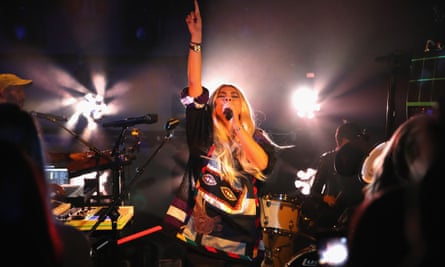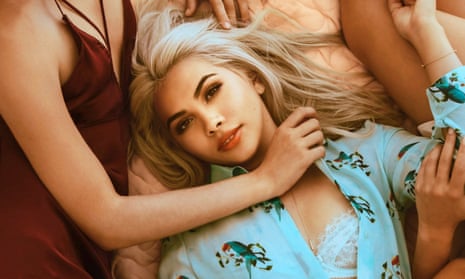It is almost 10 years since Katy Perry first sang, “I kissed a girl just to try it,” with the immediate caveat: “I hope my boyfriend don’t mind it.” Since then the song has been reassessed as evidence of a culture that fetishised queerness and feared it. Even Perry has offered an apology of sorts. “If I had to write that song again,” she said earlier this month, “I probably would make an edit on it.” But when Hayley Kiyoko first heard it in her teens, she was ecstatic.
“There was nothing out there like it,” she says over the phone from her LA hometown. She knew she was gay before then – she had a crush on a teacher when she was seven – but this was the first time she had heard a song that associated queer lust with joy: a welcome break from the shame she had been carrying. “It was a very exciting moment,” she recalls. “Of course, I wished that it was a gay girl singing, but I was like, ‘That’s gonna be me.’”
Her hunch was right – though it took some time. Now 26, Kiyoko has been performing since she was five. As a child actor, she appeared in Nickelodeon and Disney Channel shows, before landing roles in teen films. Her music career got off to a wobblier start. She joined a bubblegum girl group called the Stunners in 2010, but despite landing a major label deal and supporting Justin Bieber, they disbanded before they had even released an album.

A few years later, Kiyoko released a few solo singles through an independent label, but the unremarkable electropop failed to connect with anyone, least of all Kiyoko. She was still closeted – growing up on puritanical Disney can’t have helped in that regard – as was her music. She kissed boys in her videos, and used vague lyrical pronouns. But she grew tired of hiding: “I wrote for the first time how I truly feel about girls.”
“Girls like girls like boys do – nothing new,” she announced, every word a staccato punch over clattering synths, on her 2015 single Girls Like Girls.
Except it was something new, at least in mainstream pop. Queer female singers have been around as long as pop itself (Lesley Gore, Dusty Springfield), but their music rarely reflected their sexuality. Even in the 30 years since kd lang ostensibly opened the doors for gay women in music, depressingly few have followed in her wake – and none have truly reached the mainstream. Tegan and Sara came close, but sexist and homophobic derision put a double-glazed glass ceiling on their ascent. Halsey, Shura and Muna are turning the tide, but only Halsey has sung explicitly about women, and none have reached pop’s top rung.
Perhaps Kiyoko will be the first: after the Girls Like Girls video scored millions of views on YouTube, she signed with major Atlantic. Her EP, Citrine, cemented her fervent fan base, who call her “lesbian Jesus” and built “a community that I never had,” she says. But this profile still largely bypassed traditional commercial success. Even her brilliant new single, springy electropop anthem Curious, has only been played once on Radio 1.
Still, she has big hopes for her debut album Expectations, which celebrates queer desire while acknowledging the loneliness that can accompany it.
In songs where she is competing for her crush’s affection, her opponent is usually a man. Is she confronting men who delegitimise queer female sexuality? “No,” she laughs. “I just tend to date straight girls. That’s my problem, I’m a turner.”
Kiyoko’s hope is that her ecstatic, queer pop will help fans accept themselves. “That’s the whole reason for doing pop music and being in the mainstream and being bold: trying to showcase not [being] scared.I don’t want people to be like, ‘Well, my life’s gonna suck for the next 10 years … ’ No! Your life can be amazing now.”
What gave Kiyoko the confidence that she could be a gay pop star? The question throws her. “I wasn’t planning on being here,” she says eventually. “I’ve just been slowly stepping, stepping, stepping, and now I have this body of work that I never had growing up. If you spoke to me at 15, I would have been like: ‘Are you kidding me? I would never do that.’ Because I was just so uncomfortable with who I was. But I had this idea, and it’s built these building blocks, and I’m like, ‘Oh, this is bigger than I thought it was.’”

Comments (…)
Sign in or create your Guardian account to join the discussion